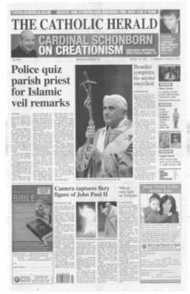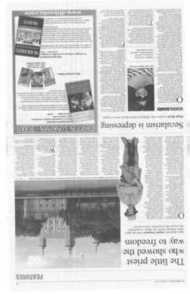Page 5, 19th October 2007
Page 5

Report an error
Noticed an error on this page?If you've noticed an error in this article please click here to report it.
Tags
Share
Related articles
From John Thavis In Vatican City
Vatican Hopes For Dialogue With Islam
Don't Let The Holy Land Become A Museum, Cardinal Urges...
Convert Attacks Cardinal Over Islam
Cardinal Tauran Hails Interfaith Progress
Scholars urged to be more self-critical
here is a general consensus in and around the Vatican that Pope Benedict XVI's recent nomination of Cardinal Jean-Louis Tauran as president of the Pontifical Council for Interreligious Dialogue was a masterstroke appointment. As the Vatican's "foreign minister" from 1990-2003, the French cardinal made many friends in key diplomatic posts around the world, most notably among leading Muslims. These connections, as he indicated in an interview with The Catholic Herald last week, will no doubt come in very handy at a time when Catholic-Muslims relations remain relatively tense.
Yet trained diplomat though he may be, Cardinal Tauran has not been one to mince his words. Before taking up his current role, he was one of the more vocal senior Vatican officials calling for reciprocity of religious freedom in Muslim-majority states_ He was also forthright in speaking out against the Iraq war, which he thought was criminal. When he sat next to Tony Blair for lunch at the Venerable English College in June, he was not afraid to share his expertise of the Middle Fast or express his views on Iraq.
But evidence suggests that as the cardinal in charge of interreligious dialogue, he feels duty-bound to take a more diplomatic position. His message in response to a letter sent last week to Christian leaders by 138 Muslim scholars was eloquent and highly complimentary. He said the letter was "very interesting" and "very encouraging" and he praised the spiritual approach of the letter in its call to work together on what is common between the faiths. But the closest he came to provoking serious debate over the letter was to ask both Christians and Muslims whether they live as though "God is One". So the meaty criticism of the initiative was left to Church scholars of Islam. One of the most highly regarded is Fr Swink Khalil Samir, a Jesuit professor of Islamic Studies at St Joseph's University in Beirut and one of Cardinal Ratzinger's former students. Fr Sarnir, an Egyptian by birth, has a history expressing clearly what is wrong with both Islam and Western civilisation. He said overall the letter was a "good step" because so many scholars, including members of both Sunni and Shia sects, signed it, and that they quoted verses from the Bible as well as the Koran. But he criticised the Muslim scholars for not confronting "the real problems in Islam today" which he listed as -fanaticism. radicalism. fundamentalism and the interpretation of the Koran". The problem, said Fr Sarnir, is that Muslims are unable to engage in self-criticism, hence the letter's warnings to Christians about repressing Muslims, but not a word about Muslims nations repressing or persecuting Christians. "Real dialogue must be auto-critical on both sides." he said.
Cardinal Tauran's appointment was a wise One. But the day when the president of the Pontifical Council for Interreligious Dialogue can publicly speak to Muslims as frankly as this Catholic scholar without fear of retaliation will be the day when Catholic-Muslims relations really will have moved on. Few here know quite what to make of the "sting" operation that appeared to frame Mgr Tommase Stenico, a senior official at the Vatican's Congregation for the Clergy. The filming of him propositioning a young male reporter. which Mgr Stenico claims he did to uncover satanism, remains a mystery. Mgr Sterne° has been suspended from his duties pending a tribunal hearing.
"The Holy See is first of all interested in cleaning up internally, but always with respect for rights and after the verdict of judicial authorities,said Cardinal Julian Herranz, president emeritus of the Pontifical Council for the Interpretation of Legislative Texts in an October 15 interview in Lzr Repubblica. The Spanish cardinal, whose expertise is in Canon Law, said the priest could be laicised if found guilty under Canon 1399 of the Code of Canon Law.
But even if it did come to that, he didn't feel it would harm the wider community of the Church. "In the various congregations, there are very many people, lay and religious, who are firmly committed to serving the Pope with seriousness, determination and love for the word of Christ," he said. When asked about the state of morality in the Vatican, the cardinal said it was "very good" and was shown by the fact that the disciplinary commission which presides over such cases is "almost out of work".
"The personnel &the Holy See are very well motivated," he said, "but any one of them can do wrong."
Rome Correspondent: Edward Pentin E-mail: vaticannotebookayahoo.COM
blog comments powered by Disqus

















